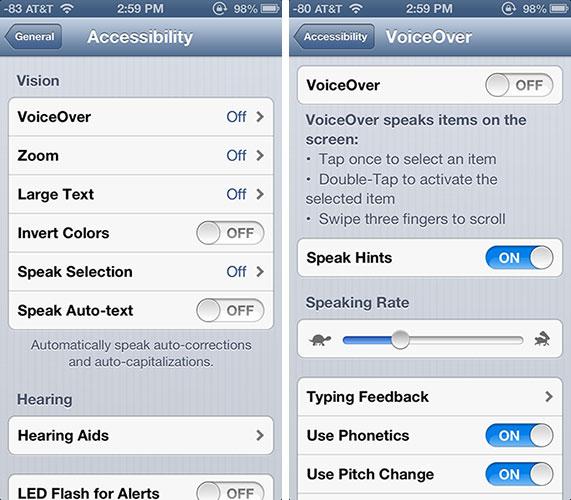The Mannheim Regional Court on Friday ordered a stay on a Samsung lawsuit against Apple, citing a parallel nullity case that could invalidate the Korean company's patent being asserted against the iPhone's VoiceOver functionality.
At issue, notes FOSS Patent's Florian Mueller, is the German version of Samsung's U.S. Patent No. 6,937,700 covering a "Device for and method of outputting data on display section of portable telephone," an accessibility property that allows visually impaired users to have on-screen text read aloud.
Apple's solution, called VoiceOver, accomplishes the basic functions described in Samsung's patent. From Apple's webpage describing the functionality as it applies to the iPhone:
With VoiceOver enabled, you’ll use a different but simple set of gestures to control iPhone. For example, instead of tapping to activate a button, tap the button to hear a description of it, double-tap to activate it, and swipe up or down to adjust a slider.When an item on the screen is selected, a black rectangle called the VoiceOver Cursor appears around it. The VoiceOver Cursor is displayed for the benefit of sighted users with whom you may be sharing your phone. When you prefer privacy, VoiceOver includes a screen curtain that turns off the display so no one can read it without your knowledge.
Mueller says that voice over functionality as described in Samsung's patent has "undisputedly existed before," and Apple forced the issue by challenging the asserted IP. In an attempt to salvage the case, Samsung narrowed its claims by focusing on a specific function that generates voice output for on-screen icons. An example would be app badge icons in iOS.
As for Samsung's latest play, Presiding Judge Andreas Voss is dubious that Samsung's claim construction will have an effect on the parallel nullity case.
While the VoiceOver option may not affect an overwhelming number of iPhone users, the deprecation of such technology could have a meaningful impact for visually impaired users.
“For decades, we have heavily invested in pioneering the development of technological innovations in the mobile industry, which have been constantly reflected in our products,†a Samsung spokesman told AllThingsD on Friday. “We continue to believe that Apple has infringed our patented mobile technologies, and we will continue to take the measures necessary to protect our intellectual property rights.â€
 Mikey Campbell
Mikey Campbell







-m.jpg)






 Chip Loder
Chip Loder
 Wesley Hilliard
Wesley Hilliard
 Marko Zivkovic
Marko Zivkovic

 Christine McKee
Christine McKee
 Amber Neely
Amber Neely

 Malcolm Owen
Malcolm Owen








10 Comments
That last statement oozes irony
Blah blah blah we're samsung we have patents that we don't use in our devices, blah blah suing apple cause we lost, blah.
Another patent that shouldn't have been granted, but probably seemed cool back in 2000.
This is ridiculous. They're taking away features for the impaired just for money. This is crossing the line.
Scumbag samsung!